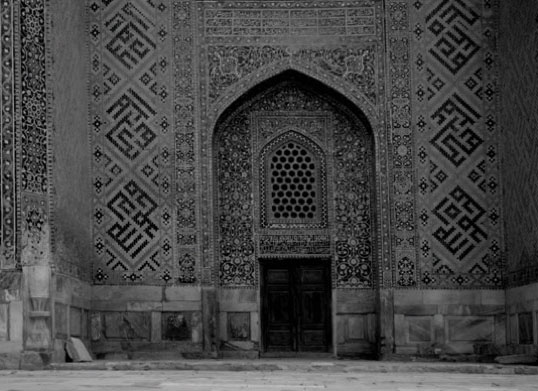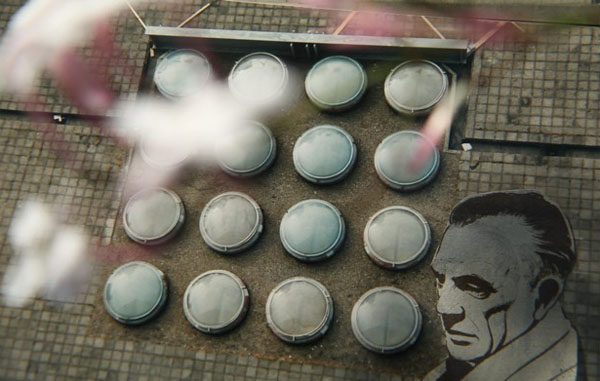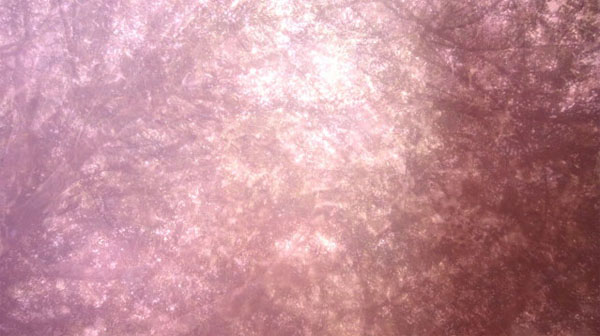Projections, the New York Film Festival sidebar formerly known as Views from the Avant-Garde, is on through Sunday, presenting thirteen programs over three days. Here in Keyframe, Aaron Cutler has surveyed several highlights and contacted a few of their makers; Kevin B. Lee and Jordan Cronk have spoken about a good handful of works featured in Toronto‘s Wavelengths program now screening in New York; and Michael Sicinski has written about Stephanie Barber and Jodie Mack, both of whom have new work being presented this weekend. Here, then, a few notes on what’s being written elsewhere.
“Not quite a documentary nor ethnography nor avant-garde,” Phillip Warnell’s Ming of Harlem: Twenty One Storeys in the Air “overlaps all three unsuitable definitions,” writes Daniel Kasman in the Notebook. Also: Lisa Truttmann and Behrouz Rae’s Babash (“the little essay emerges as a irreverent transliteration of exile and/or immigrant experience and foreign-land isolation”), Jacqueline Goss and Jenny Perlin’s The Measures (the form “is bland and not nearly as gripping as the history narrated”), Jodie Mack‘s Razzle Dazzle (“an iridescent animated flicker film”) and Blanket Statement #2: It’s All or Nothing (“a Google Maps of yarn”), Anton Ginzburg’s Pan (“one of Projections’ major highlights”), Ryan Marino’s “sylvan gem” Old Growth, Zachary Epcar’s Under the Heat Lamp an Opening (a “beaming, analytic seaside portrait”) and Nicky Hamlyn’s “shuddering corporate time-lapse film,” Renaissance Center/GM Tower.
Danny also directs us to previous writing in the Notebook on other titles, including his own thoughts on Takashi Makino’s 2012, Rebecca Baron’s Detour de Force, Blake Williams’s Red Capriccio, Sylvia Schedelbauer’s Sea of Vapors, Eric Baudelaire’s Letters to Max and Ken Jacobs’s Canopy; and Michael Sicinski on Jean-Paul Kelly’s The Innocents, Shambhavi Kaul’s Night Noon and more.
Of all the films Tony Pipolo writes about in his survey of Projections for Artforum, Lewis Klahr’s The Occidental Hotel is the one on which he lingers longest: “Populated by Klahr’s familiar cutouts of businessmen and seductive women, the fluid interchangeability of locations and people are less indicative of narrative import (in the manner of Klahr’s 2011 feature The Pettifogger) than they comprise a catalogue of the elements of melodrama and film noir—the Hollywood genres that bear endearingly on Klahr’s aesthetic…. Klahr’s slipping his cutout men and women in and out of his frames mimic the transient behavior of people passing through big cities, frequenting hotels and restaurants, and walking the streets—subjects and objects of thousands of individual stories, imaginary and real, that remain untold. What is extraordinary is the vigor with which Klahr still invests this form.”
Ben Rivers‘s Things “is particularly influenced by the nouveau roman, though it is also a departure for the artist,” writes Melissa Gronlund for Art Agenda. “The title nods to [Georges] Perec’s Les choses (1965), and the film includes shots of Robert Pinget’s Fable (1971), which is also the source material for the drawings that accompany the film in its current exhibition at Kate MacGarry, London. In both the show and the film he turns his camera and method on himself: Things is a film of him, or, more accurately, the things in his apartment, copies of which also hang in the gallery, the walls painted the same oxblood color as his home…. Things adds a strange codicil to Rivers’s stylistically (and materially) coherent body of work: it severs the link to the documentary just at the moment when he could most genuinely affirm to know the thoughts of his subjects. It is thus on the one hand another excellent Ben Rivers film, but also shows the artist working against himself, indeed even switching for the first time into the digital to see how ‘representation’ there differs.”
Julian Ross introduces an interview for Film Comment: “The experience of watching Takashi Makino’s work is perhaps best expressed by the title of one of his films: still in cosmos. On the one hand, the filmmaker attempts to create a pure frenzy through the use of multiple exposure and superimposition, but there always remains a notion that abstract chaos exists within some sort of greater order. This paradoxical tension has persisted in all aspects of his filmmaking. At times his films confront you with the visual equivalent of a shriek; in other moments, they feel completely tranquil.”
And the Film Society of Lincoln Center has been posting interviews: Jean-Paul Kelly, recipient of this year’s Kazuko Trust Award, Fern Silva (Wayward Fronds) and Jodie Mack. Let’s also note that, this afternoon, filmmaker Cathy Lee Crane will introduce a screening of Sauerbruch Hutton Architects (2013) by the late Harun Farocki.
Updates: Another Film Comment interview, this one with El Futuro director Luis López Carrasco and, introducing it, Nicholas Vroman writes: “‘A 68-minute Warhol-esque microbudget portrait film, defiantly shot in 16mm, that bowls me over,’ wrote Gavin Smith in his FC Rotterdam journal (March/April 2014). ‘Set in an apartment on the eve of the 1982 Spanish election that would bring the Socialists to power, it takes in an assortment of twentysomething partygoers, studied in singles, pairs, and groups, in a series of prolonged, attentive, but loose and informal medium shots.'”
And for the FSLC, Alexander Hunter talks with Mike Stoltz about Under the Atmosphere and with and Deborah Stratman about Second Sighted, while Maya Korn gets a few words with Joana Pimenta about The Figures Carved into the Knife by the Sap of the Banana Trees.
Update, 11/13: “Though the renaming of the program, and a handful of terms used to describe it, may seem like a subtle shift, it resituates the festival firmly in the domain of contemporary visual art,” writes Genevieve Yue in her overview for Reverse Shot. “The practice of avant-garde film, which has had a long and durable history in New York especially, may persist at Projections, but at least in name, its tradition as a relatively autonomous third term between commercial filmmaking and the art world seems to have been muted.”
NYFF 2014 Index. For news and tips throughout the day every day, follow @KeyframeDaily. Get Keyframe Daily in your inbox by signing in at fandor.com/daily.






